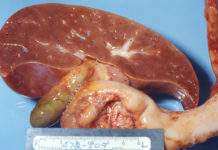
Weight loss surgery can quickly restore testosterone production and sex drive in morbidly obese men
New research presented at the European Congress on Obesity (ECO), 2018 shows that weight loss following a obesity surgery ( sleeve gastrectomy), can rapidly restore sex drive in obese men.
The weight loss works by reversing obesity-related hypogonadism in morbidly obese men (morbidly obese is defined as BMI >40kg/m2). This restores normal levels of testosterone and sex drive.
BMI is defined as the body mass or weight divided by the square of the body height, and is universally expressed in units of kg/m2. Sleeve gastrectomy is done to reduce the size of the stomach. The study was conducted by Prof Marco Rossato and colleagues at the University of Padova, Italy.
At an average weight loss of 17.2 Kg, proportion with hypogonadism had fallen to 11.6%. Average testosterone levels increased by 85%
Obesity in men is associated with hypogonadism – a condition in which production of testosterone is reduced and estrogen levels are elevated. Excess body fat interfering with sex steroid hormone metabolism leads to increased conversion of androgens (such as testosterone) into estrogens within the adipose tissue itself. The study was undertaken to determine how quickly these hormonal changes reversed following weight loss surgery.
The researchers choose a group of 29 obese men with an average age of 40.5 years and an average body mass index (BMI) of 43.4kg/m2. Blood tests were performed to measure total plasma testosterone, the sex hormones dihydrotestosterone (DHT), estradiol, luteinising hormone (LH), follicle-stimulating hormone (FSH), as well as sex hormone binding globulin (SHBG), prostatic-specific antigen (PSA), and leptin in the patients before and one month after they underwent a sleeve gastrectomy.
A group of 19 healthy age-matched, non-obese male subjects were used as control.
The study found that 51.6% of obese individuals had hypogonadism. People with metabolic syndrome (45.2%) were found to have lower plasma testosterone than men without metabolic syndrome. Metabolic syndrome is a collection of conditions with increased blood pressure, high blood sugar, excess body fat around the waist, and abnormal cholesterol or triglyceride levels, leading to increased risk of heart disease, stroke and diabetes.
BMI and waist circumference were found to be negatively correlated with total testosterone and plasma LH levels. Obese males had lower plasma testosterone than healthy subjects.
Obese individuals showed a significant weight reduction (averaging 17.2 kg), one month after weight loss surgery and the proportion with hypogonadism had fallen to 11.6%. Average testosterone levels increased by 85%.













